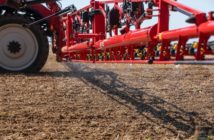The wet weather in December and January has left fields very wet and there is now a high risk of pesticides reaching drinking water, warns The Voluntary Initiative (VI).
“Applying oilseed rape herbicides in the right weather and soil conditions is critical to reducing the risks to drinking water sources,” advises the VI’s Patrick Goldsworthy. “Application only when there is no risk of heavy rain after application and when drains are not flowing is essential to reducing the risks to drinking water sources. Recent weather across the UK highlights the need for farmers to be vigilant and seek advice from their agronomist if they still need to control weeds in their rape crops”.
NIAB TAG agronomist Jon Bellamy who is based in Northants/Oxfordshire said “It was a relatively dry and exceptionally warm autumn in the South and many of my growers delayed their oilseed rape herbicide applications for blackgrass control until late November. I think they have got it about right. There’s been good weed control and the soil conditions, while still a bit warm, meant there was a much lower risk of the herbicides reaching water.”
“While probably 90% of oilseed rape herbicides have been applied, there will still be a few growers needing to make their applications especially as some products will be approaching their latest application date. My advice to them is to take note of the weather and soil conditions at application and do the best they can to reduce the risks to water.”
Further advice on protecting water can be found in Water Protection Advice Sheets which can be found on The Voluntary Initiative website – www.voluntaryinitiative.org.uk



